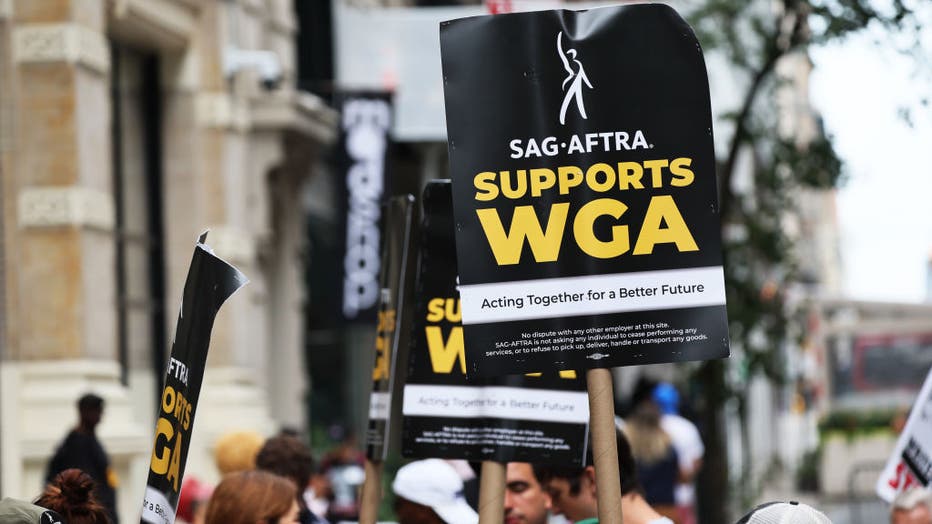Georgia film industry excited over end of Hollywood strikes
Good news for Atlanta: The actors' strike is over
Actors reach a tentative deal with Hollywood after a strike that’s lasted nearly four months. It’s the longest labor action ever for film and t-v actors. It has cost billions of dollars nationwide. The labor dispute also hurt businesses that depend on TV shows and films here in metro Atlanta.
After more than six months, the strikes that have left Hollywood at a standstill are finally over, and Georgia is ready to get its film industry moving again.
The long-awaited clearing in the industry’s stormiest season in decades comes as a deal with SAG-AFRTRA was reached late Wednesday to end what was, at nearly four months, the longest strike ever for film and television actors.
The three-year contract must be approved by the board of the Screen Actors Guild-American Federation of Television and Radio Artists and its members in the coming days. But union leadership declared that the strike would end at 12:01 a.m. on Thursday, putting all the parts of production back into action for the first time since spring.
More than 60,000 SAG-AFTRA members went on strike on July 14, joining screenwriters who had walked off the job more than two months earlier. It was the first time the two unions had been on strike together since 1960. The studios and writers reached a deal that brought their strike to an end on Sept. 26.
Actor strike is over in Georgia
As of 12:01 Thursday morning, the SAG-AFTRA strike is over. All that's left now is a final board vote slated for Friday. Actors in Georgia say they are overwhelmed to get back to work.
The union valued the deal at over a billion dollars. Crabtree-Ireland said the deal includes boosts to minimum payments to actors, a greater share of streaming revenue going to performers, a bolstering of benefit plans and protections against the unfettered use of artificial intelligence in recreating performances. Details of the terms will not be released until after a meeting on Friday where board members review the contract.
Although the writers strike had immediate, visible effects for viewers, including the months-long suspension of late-night talk shows and "Saturday Night Live," the impact of the actors’ absence was not as immediately apparent. But its ripple effects — delayed release dates and waits for new show seasons — could be felt for months or even years.
Actors should quickly return to movie sets where productions were paused, including "Deadpool 3," "Gladiator 2" and "Wicked." Other movies and shows will restart shooting once returning writers finish scripts.
While viewers will be excited about enjoying the long-awaited shows and movies that are going back into production, the news is also a huge relief for a lot of the production crews based in Atlanta and across Georgia who can get back to work.
Among the productions set to start around the Peach State include Netflix's popular "Stranger Things" and the new Marvel movie "Thunderbirds."
SAG-AFTRA union announces deal with studios
The six months of strikes put a pause on movie and show productions across Georgia.
A number of reality shows have been filmed in Atlanta over the last few months, which have helped provide some work for crews, but lifting the strike will be a huge relief for Georgia's robust film industry.
The drama of the strikes kept them in suspense at Ambient Plus Studio in southwest Atlanta. But now Ambient is ready to flip the script. "We’re all kind of chomping at the bit to get going," said studio owner Jason Ivany.
Ambient rents out space to film and T.V. heavy hitters like Netflix and NBC Productions. Georgia is home to a multi-billion-dollar entertainment industry. But Ambient’s bookings dipped 40-percent once writers and then actors went out on strike.
"We tightened our bootstraps when the strikes started," Ivany said.
Ivany had to cut back employees’ hours and take on special projects that did not require writers or actors. But things began looking up when writers went back to work.
"Our phones started ringing like crazy. Four-hundred-percent increase. Then the bookings turned into about a 20% increase in bookings," Ivany said. "Christmas came early."
"We should get another 50% increase in activity if everything else is equal," Ivany said.
Ambient Plus will be able to ramp back up and start giving employees more hours.
"I’m clearly in the hope for the best mode now," Ivany said. "We will keep the doors open."

Members of the Writers Guild of America East are joined by SAG-AFTRA members as they picket on Day 1 at the Warner Bros. Discovery NYC office on July 13, 2023 in New York City. (Photo by Michael M. Santiago/Getty Images)
According to a new study by the Georgia Screen Entertainment Coalition, production expenditure in the state increased at an average annual rate of over 17% between 2012 and 2023.
The state now has approximately 5.7 million square feet of dedicated stage space across 212 stages with $1.2 billion spent on building new facilities, expanding existing ones, and converting other buildings.
The study says in FY 2022 alone, the industry generated $8.55 billion in total economic output and supported 59,700 jobs.
The Associated Press contributed to this report.

